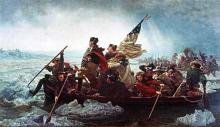One of the most pervasive misconceptions about our early history revolves around the folklore of the Revolutionary War. In primary grades we learn about our folk heroes and founding fathers, from George Washington and Benjamin Franklin to Paul Revere. Later, in the secondary grades we learn more about the various battles and personalities that came to the fore, but always with the implicit understanding that almost everyone in the colonies wanted the Revolution. In fact, in a number of textbooks the message isn't implicit at all, stating that "from all corners of the American colonies men came to pledge their loyalty to Independence." (American History, Pearson Hall). The truth is somewhat more discouraging.
Howard Zinn points out in the previous chapter that much of the resistance to the crown came not from the general population but from wealthy land-owners and the colonial elite. As the Continental Congress openly declared war against the British crown, there were a number of ways in which these instigators would rally the poor and middle-class to their cause. Black slaves and Native Americans were obviously non-starters since they had nothing to lose by joining the conflict (not to mention that many native tribes learned their lesson about taking sides in a white man's war during the French and Indian wars, in which their British allies left them high and dry afterward).
Far and away the most common reason for joining the rebel militias was simply a way out of poverty. It's not a new story (in fact it's still around today), but many of the poorest whites would join the militia for regular food, some compensation, and a title. In one excerpt a lieutenant injured at the battle of Bunker Hill describes the terms of his enlistment as one of convenience. Tired of being a simple "Labourer", he enlisted as a Lieutenant (because he brought two friends to enlist as Privates), and hoped that his Captain might die in battle so that he could rise in rank and see his "pay, rations, and station improve."(78)
Those that attempted to remain neutral in the coming war were often coerced into taking one side or another through military preparation. Connecticut passed a law that required military service of men between 16 and 60. Those that refused or attempted to desert were jailed; the conditions of their release being fighting for the rebels. In this way, as Zinn states, "the mechanism of their conversion to democracy was the militia." (79) In other places men were merely impressed into the military, bound to join or suffer the consequences, which ironically was one of the chief grievances by in the Declaration of Independence; the impressment of colonists into the British military. Conscription with exlusions to people of wealth was common practice throughout the colonies, requiring military service unless the individual could pay 5 pounds and find a substitute. Often this mean that the wealthiest would simply pay a vagrant or criminal to be their substitute, along with the 5 pound fee, and be off the hook.
Still other colonists wanted nothing to do with the war, recognizing it as a transfer of power from one wealthy elite to another. This was particularly true int he South, where most of the colonial militas were absorbed with preventing slave uprisings (in South Carolina nearly 50% of the population were slaves). However, The British saw opportuntiy in this, and one of the British miliary commanders, Lord Dunmore in Virginia, offered freedoms to any blacks that offered to serve in the British military.
The Revolutionary War served a secondary purpose, other than ultimately winning the colonies independence (with critical help from the French); it subverted the internal class conflicts between the wealthy landowners and poor, armed whites. It gave the conflict an vicarious outlet in the killing, looting, and pillaging of British Loyalists and armies; all in the anme of independence. However, that's not to say that there weren't eruptions of this class conflict from time to time. Zinn highlights several mutinies among militiamen and civilians against the colonial elite during this time. Twice the Continental Congress in Philadelphia was marched upon by poor militiamen that had not received pay from the struggling colonial coffers; once succeeding in driving the governance form their newly established statehouse. There are also a number of uprisings against wealthy colonials and merchants accused of stockpiling commodities to drive up prices during wartime.
If there's one significant truth to the end of the Revolutionary Way it is the idealism that pervaded over nepotism and avarice during the construction of the new American government. Alexander Hamilton and many supporters advocated Senate and Presidential positions for life (some even goin as far to suggest a lineage of inheritance, like with the British throne). Instead, and as hypocritical as this may seem in modern times, perpetuated as it was by wealthy, slave-owning aristocrats, the foundation was laid for public service, publicly funded schools, and a central government that was ostensibly formed for governance of the people. Though the Revolutionary War was fought and died for by the people with the least to lose by continued British rule, it did become a startling model of democratic principle (not right away, of course) and set a humanistic precedent that would defy all contemporary odds in ultimately becoming a world power.
